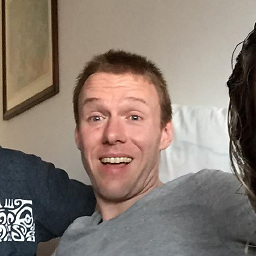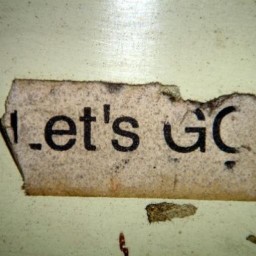How to shift an array of bytes by 12-bits
Solution 1
Hurray for pointers!
This code works by looking ahead 12 bits for each byte and copying the proper bits forward. 12 bits is the bottom half (nybble) of the next byte and the top half of 2 bytes away.
unsigned char length = 10;
unsigned char data[10] = {0x0,0x0,0x0,0x0,0x0,0x0,0x0,0x0,0x0A,0xBC};
unsigned char *shift = data;
while (shift < data+(length-2)) {
*shift = (*(shift+1)&0x0F)<<4 | (*(shift+2)&0xF0)>>4;
shift++;
}
*(data+length-2) = (*(data+length-1)&0x0F)<<4;
*(data+length-1) = 0x00;
Justin wrote:
@Mike, your solution works, but does not carry.
Well, I'd say a normal shift operation does just that (called overflow), and just lets the extra bits fall off the right or left. It's simple enough to carry if you wanted to - just save the 12 bits before you start to shift. Maybe you want a circular shift, to put the overflowed bits back at the bottom? Maybe you want to realloc the array and make it larger? Return the overflow to the caller? Return a boolean if non-zero data was overflowed? You'd have to define what carry means to you.
unsigned char overflow[2];
*overflow = (*data&0xF0)>>4;
*(overflow+1) = (*data&0x0F)<<4 | (*(data+1)&0xF0)>>4;
while (shift < data+(length-2)) {
/* normal shifting */
}
/* now would be the time to copy it back if you want to carry it somewhere */
*(data+length-2) = (*(data+length-1)&0x0F)<<4 | (*(overflow)&0x0F);
*(data+length-1) = *(overflow+1);
/* You could return a 16-bit carry int,
* but endian-ness makes that look weird
* if you care about the physical layout */
unsigned short carry = *(overflow+1)<<8 | *overflow;
Solution 2
Here's my solution, but even more importantly my approach to solving the problem.
I approached the problem by
- drawing the memory cells and drawing arrows from the destination to the source.
- made a table showing the above drawing.
- labeling each row in the table with the relative byte address.
This showed me the pattern:
- let
iLbe the low nybble (half byte) ofa[i] - let
iHbe the high nybble ofa[i] iH = (i+1)LiL = (i+2)H
This pattern holds for all bytes.
Translating into C, this means:
a[i] = (iH << 4) OR iL
a[i] = ((a[i+1] & 0x0f) << 4) | ((a[i+2] & 0xf0) >> 4)
We now make three more observations:
- since we carry out the assignments left to right, we don't need to store any values in temporary variables.
- we will have a special case for the tail: all
12 bitsat the end will be zero. - we must avoid reading undefined memory past the array. since we never read more than
a[i+2], this only affects the last two bytes
So, we
- handle the general case by looping for
N-2 bytesand performing the general calculation above - handle the next to last byte by it by setting
iH = (i+1)L - handle the last byte by setting it to
0
given a with length N, we get:
for (i = 0; i < N - 2; ++i) {
a[i] = ((a[i+1] & 0x0f) << 4) | ((a[i+2] & 0xf0) >> 4);
}
a[N-2] = (a[N-1) & 0x0f) << 4;
a[N-1] = 0;
And there you have it... the array is shifted left by 12 bits. It could easily be generalized to shifting N bits, noting that there will be M assignment statements where M = number of bits modulo 8, I believe.
The loop could be made more efficient on some machines by translating to pointers
for (p = a, p2=a+N-2; p != p2; ++p) {
*p = ((*(p+1) & 0x0f) << 4) | (((*(p+2) & 0xf0) >> 4);
}
and by using the largest integer data type supported by the CPU.
(I've just typed this in, so now would be a good time for somebody to review the code, especially since bit twiddling is notoriously easy to get wrong.)
Solution 3
Lets make it the best way to shift N bits in the array of 8 bit integers.
N - Total number of bits to shift
F = (N / 8) - Full 8 bit integers shifted
R = (N % 8) - Remaining bits that need to be shifted
I guess from here you would have to find the most optimal way to make use of this data to move around ints in an array. Generic algorithms would be to apply the full integer shifts by starting from the right of the array and moving each integer F indexes. Zero fill the newly empty spaces. Then finally perform an R bit shift on all of the indexes, again starting from the right.
In the case of shifting 0xBC by R bits you can calculate the overflow by doing a bitwise AND, and the shift using the bitshift operator:
// 0xAB shifted 4 bits is:
(0xAB & 0x0F) >> 4 // is the overflow (0x0A)
0xAB << 4 // is the shifted value (0xB0)
Keep in mind that the 4 bits is just a simple mask: 0x0F or just 0b00001111. This is easy to calculate, dynamically build, or you can even use a simple static lookup table.
I hope that is generic enough. I'm not good with C/C++ at all so maybe someone can clean up my syntax or be more specific.
Bonus: If you're crafty with your C you might be able to fudge multiple array indexes into a single 16, 32, or even 64 bit integer and perform the shifts. But that is prabably not very portable and I would recommend against this. Just a possible optimization.
Solution 4
Here a working solution, using temporary variables:
void shift_4bits_left(uint8_t* array, uint16_t size)
{
int i;
uint8_t shifted = 0x00;
uint8_t overflow = (0xF0 & array[0]) >> 4;
for (i = (size - 1); i >= 0; i--)
{
shifted = (array[i] << 4) | overflow;
overflow = (0xF0 & array[i]) >> 4;
array[i] = shifted;
}
}
Call this function 3 times for a 12-bit shift.
Mike's solution maybe faster, due to the use of temporary variables.
Solution 5
The 32 bit version... :-) Handles 1 <= count <= num_words
#include <stdio.h>
unsigned int array[] = {0x12345678,0x9abcdef0,0x12345678,0x9abcdef0,0x66666666};
int main(void) {
int count;
unsigned int *from, *to;
from = &array[0];
to = &array[0];
count = 5;
while (count-- > 1) {
*to++ = (*from<<12) | ((*++from>>20)&0xfff);
};
*to = (*from<<12);
printf("%x\n", array[0]);
printf("%x\n", array[1]);
printf("%x\n", array[2]);
printf("%x\n", array[3]);
printf("%x\n", array[4]);
return 0;
}
Comments
-
 Justin Tanner almost 3 years
Justin Tanner almost 3 yearsI want to shift the contents of an array of bytes by 12-bit to the left.
For example, starting with this array of type
uint8_t shift[10]:{0x00, 0x00, 0x00, 0x00, 0x00, 0x00, 0x00, 0x00, 0x0A, 0xBC}I'd like to shift it to the left by 12-bits resulting in:
{0x00, 0x00, 0x00, 0x00, 0x00, 0x00, 0x00, 0xAB, 0xC0, 0x00} -
 Dominic Cooney about 15 yearsThis will dereference past the end of the array when the array is zero-length or only contains a single byte.
Dominic Cooney about 15 yearsThis will dereference past the end of the array when the array is zero-length or only contains a single byte. -
 stefanct about 7 yearsIncrementing
stefanct about 7 yearsIncrementingfromand reading it in the same statement provokes undefined behavior. Even if not, the order of evaluation of the two occurrences offromwould be undefined and not guaranteed to happen in the right order. -
zahra over 2 years@Justin_Tanner How do I have to change the above code for a 2bit left shift?